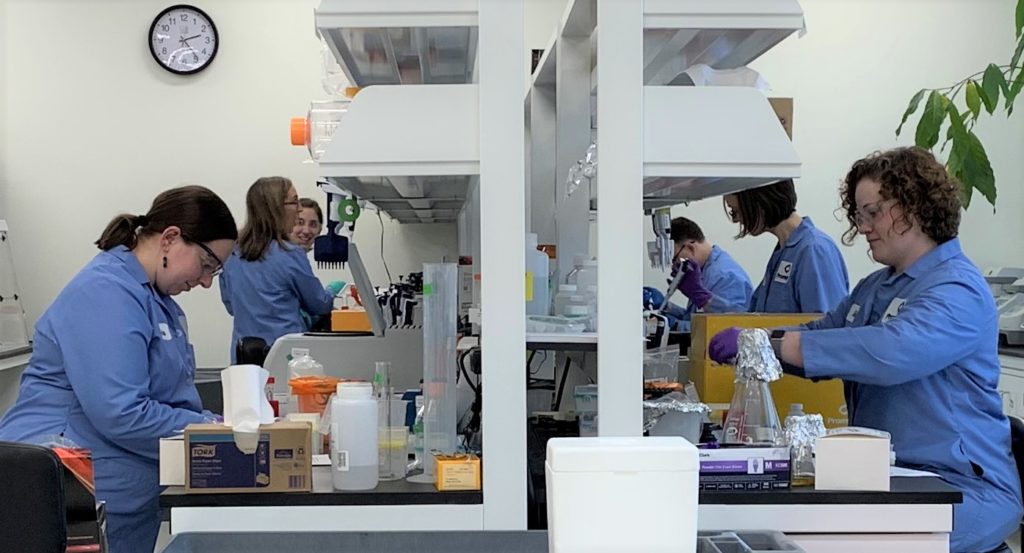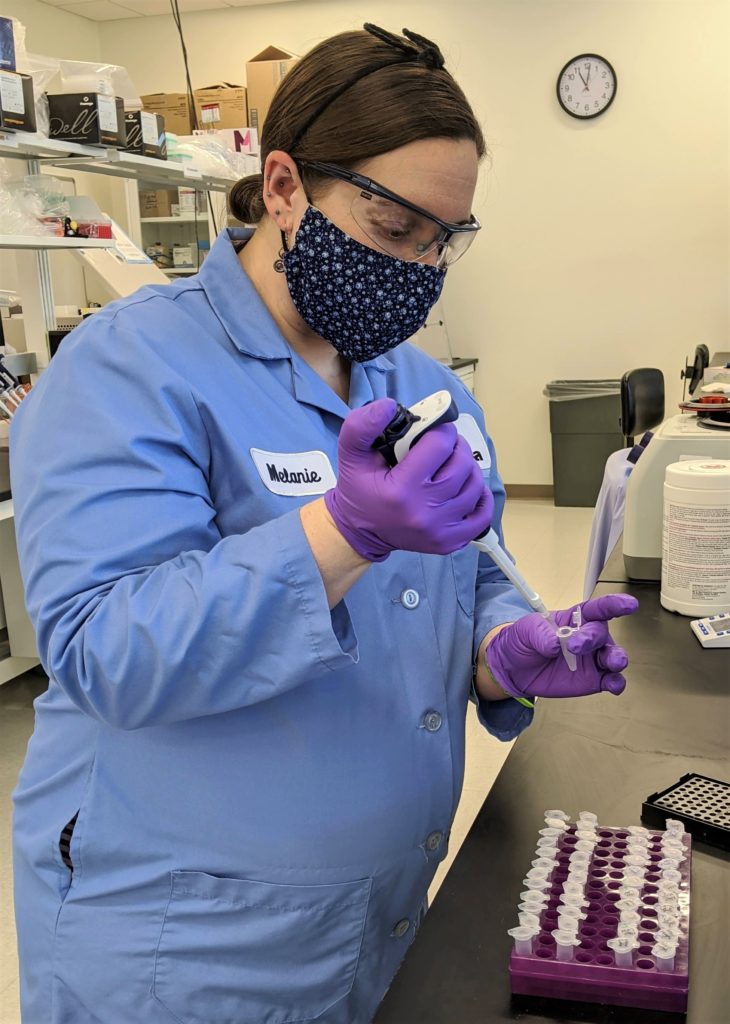The COVID-19 pandemic has affected virtually everyone’s lives and business, and Promega is no exception. If you’re a frequent reader of Promega Connections, you have probably noticed that many of our recent blog posts have mentioned the novel coronavirus.

As Applications Scientists at Promega, we have adapted our work to enable support of our Promega colleagues and their customers as they respond to the pandemic. Like other groups in the company, we have ramped up our efforts. Our team typically has a broad focus on a variety of projects from across market segments of the company. During the second week of March, we switched to completely focus on virus-related experiments. Everyone on our team was in the lab collaborating on a large project to determine which kits could be used to purify viral nucleic acid from universal transport medium for virus (UTM®) and sputum, knowing that customers would be using any kit that they had on hand to do testing quickly. We completed testing in two days and data analysis and write-up within another couple of days.
In the last six weeks, we have worked on over 30 projects and completed almost 20 of them. In some cases, we identified, resourced, and began projects in the same day. In other cases, we completed projects within a day or two of receiving the request. You can find some of our data, presented as “Viral RNA Extraction Application Notes”, here.
Many projects originated from direct questions from global branches, Technical Services, and other internal colleagues on behalf of their customers. Some projects resulted from a need we identified, such as testing alternative storage methods for swab transport due to shortage of UTM®. Projects ranged from testing purification kits with relevant sample types, to comparing amplification reagents, and participating in work on forthcoming virus-related products.
We also experienced first-hand what customers are going through with regard to conserving dwindling supplies. For example, eventually, we could not source UTM®, so we made viral transport medium using a recipe from the US Centers for Disease Control (CDC). We knew that swabs were in short supply, so we tested saliva as an alternative sample type. We designed all of our experiments prudently to get high quality data while using as few limiting reagents as possible.
Because of the large influx of project requests and the speed with which we needed results, we quickly realized that, not only did we need to respond rapidly to support our colleagues and customers, we also needed to ensure that our own team was supported in order to continue our experiments. We split into two groups, one that worked in the lab for two weeks and the other that worked from home for two weeks. The idea was that we would switch our working location after each two-week period. That way, if someone in the “lab” group became ill, only those group members would be quarantined, and the “home” group would be able to come back to the lab to work. Fortunately, we were able to use additional lab space in a different building, so now both teams are continuing lab work in separate locations.

Personally, I have viewed the changes brought on by the pandemic through a different lens. I’m expecting my first child in just a few weeks (yikes!), so I have had to make decisions not only to protect myself but to keep my family safe. I have felt fortunate to be able to contribute to our group’s efforts as much as possible before starting to work from home this week to quarantine myself in preparation for an inevitable trip to the hospital. During the past six weeks, I have only traveled between my home and work or doctor appointments. Even those appointments have looked very different—when possible, they have been over the phone or through video. When an in-person visit is needed, I don my mask, follow the strict protocols put in place by the doctor’s office to keep all patients safe, and wash my hands incessantly.
While I know that physical distancing is essential, it feels weird that I can’t stop by the local coffee shop, run a quick errand, or pick up take-out dinner on the way home from work. I find myself asking, “Is it worth it to expose myself to a different environment even once?” Social distancing has almost made me feel rude at times. For example, when my husband and I walk our dogs, we quickly cross the street if someone is walking toward us to maintain our distance. I have also had to temporarily give up volunteering at the local food pantry at a time when so many people need help, which makes me feel even more disconnected. But I know that it’s important to be careful. If I or my husband contract COVID-19 close to delivery time, then it’s possible that we would be separated from our daughter after birth to keep her safe, according to CDC considerations for inpatient obstetric care. Despite what’s going on in my personal life, I’m glad that I’ve been able to participate in meaningful work at Promega. I’m lucky to have such wonderful, supportive colleagues, and I look forward to rejoining them in the lab after my leave time is over.
To end on a professional note, despite the grim toll COVID-19 has taken on the world, this has been an exciting and stressful time scientifically. I know that our team is grateful for the opportunity to contribute impactful research to inform scientists on the front lines confronting COVID-19. The fast pace and long hours have been worth it!
